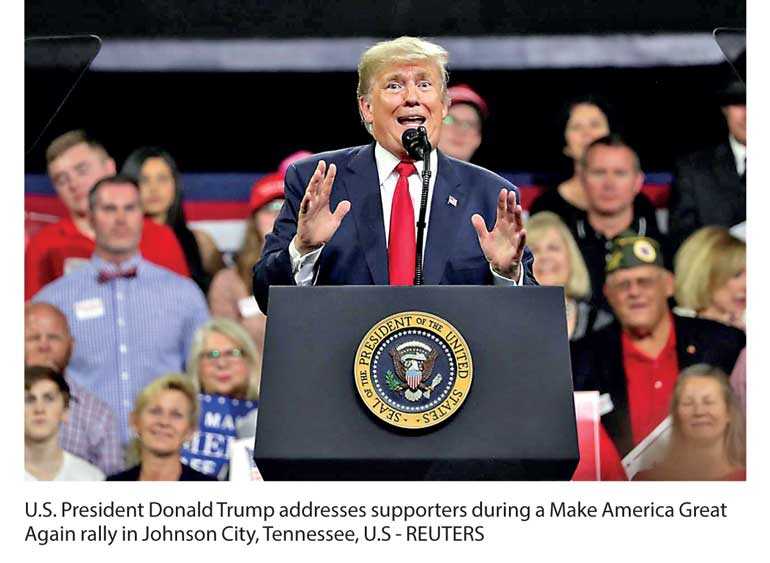Wednesday Feb 25, 2026
Wednesday Feb 25, 2026
Wednesday, 3 October 2018 00:00 - - {{hitsCtrl.values.hits}}
 (Reuters): Fresh from clinching an updated North American commerce pact, US President Donald Trump on Monday criticised Indian and Brazilian trade tactics, describing the latter as being “maybe the toughest in the world” in terms of protectionism.
(Reuters): Fresh from clinching an updated North American commerce pact, US President Donald Trump on Monday criticised Indian and Brazilian trade tactics, describing the latter as being “maybe the toughest in the world” in terms of protectionism.
Addressing reporters at a White House event to celebrate the agreement of an updated trilateral trade deal between the United States, Mexico and Canada, Trump added India and Brazil to a growing list of countries that, he argues, treat the world’s top economy unfairly in terms of commerce.
“India charges us tremendous tariffs. When we send Harley Davidson motorcycles, other things to India, they charge very, very high tariffs,” Trump said, adding that he had brought up the issue with Indian Prime Minister Narendra Modi, who he said was “going to reduce them very substantially.”
Modi’s office could not immediately be reached for a request for comment. India’s government has become more protectionist in recent months, raising import tariffs on a growing number of goods as it promotes its ‘Make in India’ program.
After criticising India, Trump turned to Brazil, the second-largest economy in the Americas behind the United States.
“Brazil’s another one. That’s a beauty. They charge us whatever they want,” he said. “If you ask some of the companies, they say Brazil is among the toughest in the world – maybe the toughest in the world.”
Brazil is one of the world’s most closed major economies, and in recent months has tussled with the Trump administration over trade in sectors such as ethanol and steel.
After Trump’s comments, Brazil’s Foreign Trade Minister, Abrão Neto, defended the relationship, saying it was “very positive.” He added that over the last 10 years, the United States has enjoyed a trade surplus with Brazil of $90 billion in goods, and of $250 billion in goods and services.
Neto pointed out that the United States was Brazil’s second-largest trading partner, behind China, and that the two countries had a “complementary and strategic” commercial relationship that could, nonetheless, be improved.
Trump’s “America First” trade policies, particularly his escalating trade war with China, are aimed at boosting US manufacturing, but they have spooked investors who worry that supply lines could be fractured and global growth derailed.
There are now US tariffs active on $250 billion worth of Chinese goods, with threats on additional goods worth $267 billion.
WASHINGTON (Reuters): President Donald Trump on Monday touted a new trade deal with Canada and Mexico as a win for US workers while investors breathed a sigh of relief that the key pillars of NAFTA had survived his hardball strategy to reshape global commerce.
Washington and Ottawa reached an agreement on Sunday after weeks of tense bilateral talks to update the 1994 North American Free Trade Agreement. The United States had forged a separate trade deal with Mexico, the third member of NAFTA, in August.
The new agreement, called the United States-Mexico-Canada Agreement (USMCA), is aimed at bringing more jobs into the United States, with Canada and Mexico accepting more restrictive commerce with the United States, their main export customer.
“These measures will support many – hundreds of thousands – American jobs,” Trump said at the White House, describing the trade deal as “the most important” the United States had ever made.
“It means far more American jobs, and these are high-quality jobs,” he said. Trump had repeatedly called NAFTA a terrible deal for the United States.
Any US job gains are likely years away, but the deal provides Trump with a victory that he can tout at campaign rallies over the next month on behalf of fellow Republicans running in the 6 Nov. congressional elections.
But auto industry officials privately said job gains would be more limited, partly because tighter autos content rules would raise their costs even as the deal eases worries that they would have to tear up supply chains and move existing assembly plants.
Praise from the lobbying group representing Ford Motor Co., General Motors and Fiat Chrysler was measured.
“We had to make compromises, and some were more difficult than others,” Trudeau said at a news conference. “We never believed that it would be easy, and it wasn’t, but today is a good day for Canada.”
Trudeau did win a face-saving preservation of a key trade dispute settlement mechanism to fight US anti-dumping tariffs.
Initial US reaction was effusive, with auto workers, dairy farmers and wheat producers saying the deal would likely create job opportunities and open up agricultural markets.
A NAFTA collapse could have caused US farmers, a key Trump constituency, to lose access to major agricultural markets in Canada and Mexico at the same time that China has halted purchases of US soybeans and other commodities due to a tariff war. NAFTA underpins about $1.2 trillion in annual trade between its three member countries.
US, Canadian and Mexican stocks jumped early on Monday before paring gains later.
The deal ends a major source of trade irritation as the Trump administration pivots to a much bigger fight with China, where US tariffs now are active on $250 billion worth of Chinese goods and threatened on $267 billion more.
Mexico’s Guajardo on Monday said the new accord could be signed by the three countries’ leaders when they meet at a Group of 20 summit in Buenos Aires in late November.